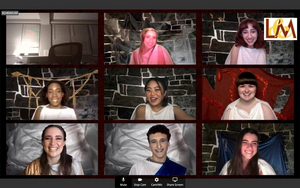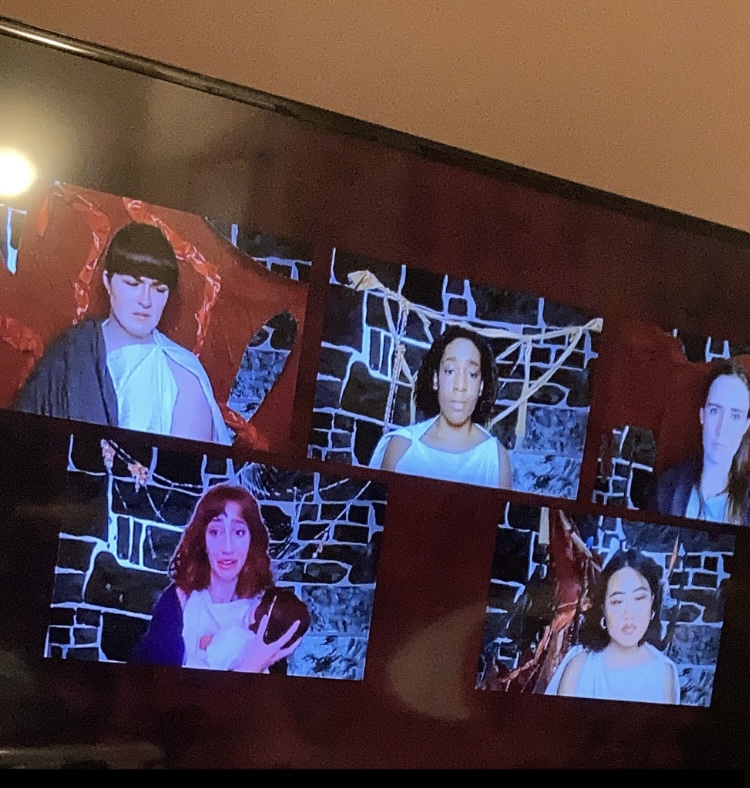BWW Blog: Bringing Ancient Greek Tragedy to Today's Virtual Stage
I was all the more curious about what it would be like to bring this two-thousand-year-old story to this modern frontier of virtual theatre-making.

We tend to think of Greek tragedy as the earliest form of drama - the exact opposite of the oddly futuristic theatre world we inhabit now, in which actors and audiences around the world connect through screens for Zoom readings and YouTube cabarets. So it felt a bit ironic to learn that one of the only student productions still occurring after Northwestern University's announcement of a fully virtual fall performance season would be The Trojan Women, Euripides' ancient Greek tragedy that follows the women of Troy in the aftermath of their city's defeat in the Trojan War. After being cast in the production, I was all the more curious about what it would be like to bring this two-thousand-year-old story to this modern frontier of virtual theatre-making.
After making theater online for eight months, I was aware that the limitations of virtual theatre can make it sometimes frustrating or tiresome. But from the first day of the process, just being back in a rehearsal room -- albeit virtual -- was thrilling. Cast/director discussions, which transitioned easily to this format, were especially important for this production, and every day I found myself looking forward to jumping on Zoom and learning more from the brilliant group of artists and thinkers this production had brought together. Together, we made sense of an unfamiliar style of drama, worked to understand these challenging characters, and recognized themes (like societal and patriarchal expectations for women) that resonate today. Other features specific to Greek drama also transitioned well: the style is dominated by long speeches, which lend themselves better to virtual formats than scene work, and the genre in which many significant events happen offstage and are merely reported prevents a need for complex blocking or elaborate stagecraft.
.png)
for virtual Greek drama
I had become accustomed to the role of designers going mostly out the window in virtual theatre. But their role in this production did anything but: the play became a brilliant showcase of the creative ingenuity of Northwestern's undergraduate designers. Our set designer created virtual backgrounds to be used with provided green screens, onto which we could add and remove small real-life set pieces. Our lighting designer provided the cast with ring lights and color-changing LED tape to frame our computer screens, allowing for different lighting cues over the course of the play. Our costume designer provided ancient-Greek-style accessories and instructions for turning sheets into togas, our makeup designer provided guidance for transformation into fallen Trojan monarchs and Greek gods, our sound designer provided lavalier mics for high-quality sound, and our prop designer provided me with a realistic baby doll (costumed in impeccable ancient Greek style) to play the child my character held for most of the play.
Of course, the virtual format presented challenges. Scene work was complicated as we navigated eye lines (do we look directly at the camera? Or at the little Zoom square of our scene partner- even if it makes our eyes look slightly downcast?). In a style of drama that pushes to the furthest extremes of human emotion - which would normally call for dramatic physical expression -- it was difficult to remain mostly static at a computer screen. And especially after being lucky enough to return to (socially-distant, masked) in-person acting classes, with scene partners in the room and an audience of classmates to connect with, it was difficult to come back to a computer screen where we had to simply trust in the existence of an audience, who could only even convey their existence through comments on our YouTube livestream.

streaming across the country!
Nonetheless, virtual theatre is infinitely better than no theatre at all. I was able to apply lessons I've learned in my acting classes - which actually focus on Greek drama this quarter - to a demanding and rich role. I was able to connect, learn, and collaborate with an ensemble of brilliant, inspiring artists. Friends and family across the country, for whom my college theatre performances are usually inaccessible, were able to tune in to our performances, streamed live for two nights on YouTube via Streamyard (our closing performance is still accessible, if you'd like to check it out: https://youtu.be/G2zBENcDep4). Traditional theatre may be on hold, but for this dramatically distanced audience, for every artist involved in this production, and for myself, this journey into an ancient play illuminated just what theatre in this current moment can be: art that still moves, showcases innovative creation, and inspires thought, reflection, and action - even in a moment when the struggles and uncertainty of the women of ancient Troy feel more familiar than we might like!
Videos
.png)
